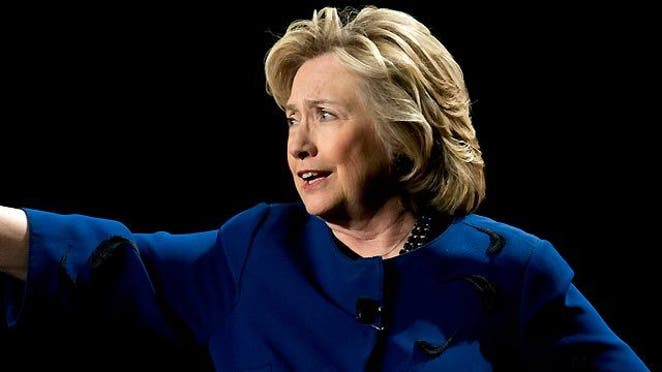http://www.foxnews.com/politics/2014/02/28/clinton-files-advisers-worked-to-humanize/?intcmp=latestnews Clinton Files: Advisers pushed to 'humanize' Hillary, soften 'stern' imagePublished February 28, 2014FoxNews.com

Even in the early days of the Clinton White House, consultants and political advisers were scrambling to soften Hillary Clinton's hard-edged image, looking for ways to "humanize her" for the press and public.
In the latter years, as the media turned, the advice was far more blunt. "Be real," media consultant Mandy Grunwald told her in a 1999 memo. Grunwald told the first lady the public tends to see her only in "very stern situations," and warned her not to let the press see her "uncomfortable or testy.
The advice was contained in roughly 4,000 pages of previously confidential documents from the Clinton administration years, released Friday by the National Archives. The document dump is just the first batch of Clinton papers that will trickle into the public domain in the coming weeks.
The materials will be closely combed by political operatives on both sides of the aisle, as Hillary Clinton weighs a presidential bid in 2016. What the documents reveal about former President Bill Clinton may be less important, politically, than what they reveal about his wife.
The 1999 memo was a particularly frank example of advisers looking to style Clinton for the public. At the time, Grunwald was with the Grunwald Communications firm she founded and was trying to smooth relations between retiring New York Sen. Daniel Patrick Moynihan and Clinton -- who would later win Moynihan's seat. The memo referred to an upcoming "Moynihan event." Grunwald urged Clinton to stay "conversational" and not raise her voice.
Her advice was to stay "chatty, intimate, informal."
"Don't be defensive," she wrote. "Look like you want the questions: The press is obviously watching to see if they can make you uncomfortable or testy. Even on the annoying questions, give relaxed answers."
Touching on what could be called a trade secret, she also chided Clinton for often answering "just the question asked."
"That's good manners, but bad politics," Grunwald wrote. "Take every opportunity you can to shift your response to an area you want to talk about and then be really expansive on that part of the answer."
Another memo from her press secretary, Lisa Caputo, encouraged the Clintons to capitalize on their 20th wedding anniversary as "a wonderful opportunity for Hillary" and also suggested she spend more time doing White House events celebrating first ladies of the past.
Placing Clinton in a historical context "may help to round out her image and make what she is doing seem less extreme or different in the eyes of the media," Caputo wrote in a lengthy August 1995 memo about courting better press coverage as the president looked toward re-election.
Caputo also proposed the "wild idea" of having Clinton do a guest appearance on a popular sitcom of the day, "Home Improvement."
The memo urged the first lady to have a much bigger presence in "women's media," at one point advising that she should "own" it. The memo also stressed that the "Internet has become a very popular mode of communication," and Hillary Clinton could use it to reach young women.
"I think Hillary could have fun with this," she wrote.
Other documents offered a glimpse into the juggling of priorities early in Clinton's first term.
Friday's documents release included memos related to the former president's ill-fated health care reform proposal in 1993 and 1994, a plan that failed to win support in Congress and turned into a rallying cry for Republicans in the 1994 midterm elections. As first lady, Hillary Clinton chaired her husband's health care task force, largely meeting in secret to develop a plan to provide universal health insurance coverage.
White House aides expressed initial optimism about her ability to help craft and enact a major overhaul of U.S. health care.
"The first lady's months of meetings with the Congress has produced a significant amount of trust and confidence by the members in her ability to help produce a viable health reform legislative product with the president," said an undated and unsigned document, which was cataloged with others from April 1993. The document urged quick action, warning that enthusiasm for health reform "will fade over time."
But the documents also showed the growing concerns among Clinton's fellow Democrats in Congress. Lawmakers, it said, "going to their home districts for the August break are petrified about having difficult health care reform issues/questions thrown at them."
By September 1993, Mrs. Clinton acknowledged the obstacles in a Capitol Hill meeting with House and Senate Democratic leaders and committee chairs. "I think that, unfortunately, in the glare of the public political process, we may not have as much time as we need for that kind of thoughtful reflection and research," the first lady said, citing "this period of challenge."
The new documents offer only glimmers of Clinton's internal national security deliberations. The most detailed material, contained in files from then-national security speechwriter Paul Orzulak, show top Clinton officials wrestling with how to deal with China's emergence as a world financial power.
Notes from an undated meeting with National Security Adviser Samuel "Sandy" Berger show Berger pushing for China's membership in the World Trade Organization despite concerns about human rights abuses.
A series of emails pertaining to the 9/11 Commission's research into Clinton-era handling of Al Qaeda attacks were all apparently withheld by Archives officials, citing national security and confidential restrictions. The only memo released was a single July 1998 email about whether to send a high-ranking diplomat to Minnesota with a presidential message to greet ailing Jordanian King Hussein. "Sounds like too much crepe hanging," said a dismissive State Department official.
The Associated Press contributed to this report.